tl;dr
I attended the RAISE Summit 2025 in Paris (July 8-9, 2025) with my colleague Gabriel. The conference featured 6500 attendees and focused on AI innovations with fireside chats and workshops. Key highlights included networking opportunities, after-events with The AI Collective, and participating in a hackathon where I built VoiceVault using Vultr's infrastructure. Great experience despite some travel challenges and Paris rain.
I had the pleasure to attend the RAISE Summit this year in Paris together with my colleague Gabriel Lipnik. I'm very thankful that our employer Anexia gave us this opportunity.
The summit was held on July 8-9, 2025 at Le Carrousel du Louvre under the motto Where visionaries and AI converge and with about 6500 attendees.
In the following I will share my experience at the summit and my first visit of the capital of France.
Getting there
The journey started on Monday morning, at 5:00 AM, heading to take the plane from Klagenfurt. It was maybe the first time I experienced a queue at the security check of the airport, and it appears that the flight to Vienna was fully booked, which caused a slight delay until the boarding was complete.
We had a short time to get to our plane to Paris, and it seems that connections to Frankfurt were also affected. I was quite impressed how the airline reacted to the delay and organized the transport, so we were taken directly from one plane to the next one.
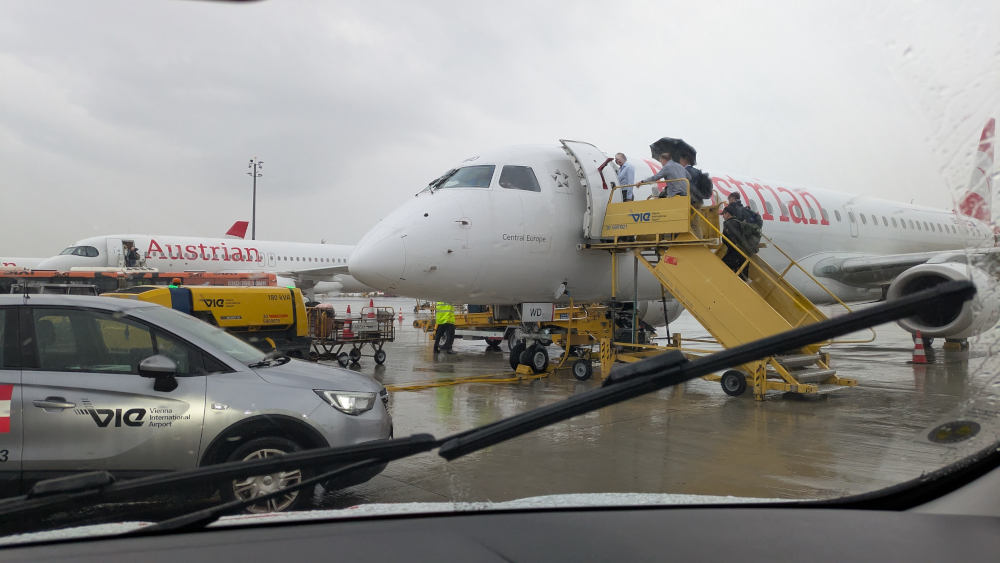
I forgot to mention that it rained.
The rest went smooth, and once we landed in Paris we tried to figure out how to get into the city. There are travel cards for the public transport and there is also an app, it seems that both of them work using NFC. We decided at that moment to install the App, as we were not able to figure out how the ticket machine works at the airport (after clicking around the machine wanted to calculate routes and did not find any).
I would recommend installing the IDF Mobilités app before and configure it, as this saves you a lot of time and trouble. The app will also require a second app to be installed and configured in order to access NFC.
You then need to figure out how the app works and get your ticket. From the Airport CDG we traveled with the RER train. There is a section in the app for Single Tickets where a One Way from/to Airport ticket can be bought. To validate it you have to hold your phone at the train station entry over the green area, afterwards you can enter.
Finding the venue
Once we arrived we got notified that we can already go and collect our badges for the conference. After depositing our luggage at the hotel and some sightseeing we went to Hotel Louvre and received our badges.
The venue is located at the underground of Louvre, which we found after a short visit at the museum.
The conference
Arriving there the first day, we found out why we had QR codes on our badges, they used them to track everybody going in and out of the venue. Also they tracked the people that went to the session stages.
The sessions were grouped into 3 Tracks and there was one extra track for the sessions of a bigger sponsor.
Most sessions were in a podium discussion format of different people that have a leading role in an AI Company, either Startup (even if they don't prefer the naming) or well established in the IT sector.
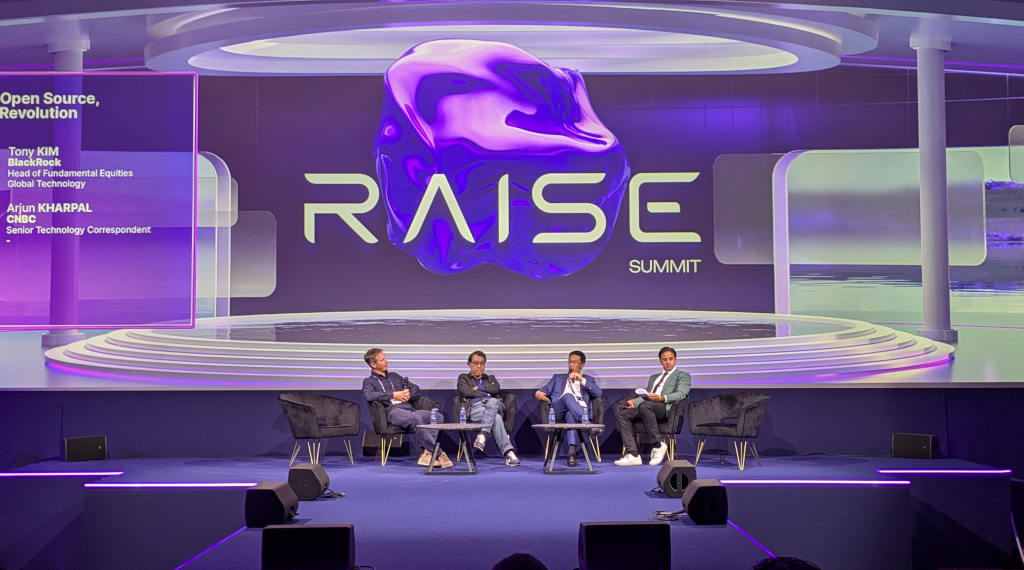
Some of the sessions I'd like to highlight:
- The AI Evolution: Open Source, Fast Inference, and the Agentic Revolution
- Winning in the Era of Data and Intelligence
- Fireside Chat with Prashanth Chandrasekar, CEO of Stack Overflow
- Enterprise Performance in the Age of the AI Workforce: Sarah Franklin, Lattice, Alexandre Dayon, Entrepreneur
- ElevenLabs Fireside Chat with Mati Staniszewski
- Workshop: Agentic Pipelines orchestrating open-source LLMs
- OSS Paradox: Free Software, Priceless Value (Open Source)
- WEKA Keynote: Rise of Token Economy
My personal highlight was the Agentic Pipeline workshop, which used n8n as the infrastructure and showed some interesting use cases how to combine existing LLMs with other tools and connect them in order to persist data.
The hall
In the hall there were all the sponsors, since this was a very crowded event the list was huge.
The main topics of the exhibitors were:
- AI Inference (approx. half of the sponsors)
- GPU Cloud Providers
- GPU Marketplaces
I was a bit disappointed that there was no booth reserved to open source projects. Also AI for edge devices was underrepresented, only Intel stood out with some good use cases related to edge AI, and use cases that can run efficiently on CPU with low energy consumption.
The hall is a great place to talk to people from all the different industries and also to chat with other people. This is the best place to make new connections and exchange ideas.
After events
Another great way to exchange ideas and meet new people are the after events. There were a few, in order to attend there was a dedicated app where you had to register and wait for approval.
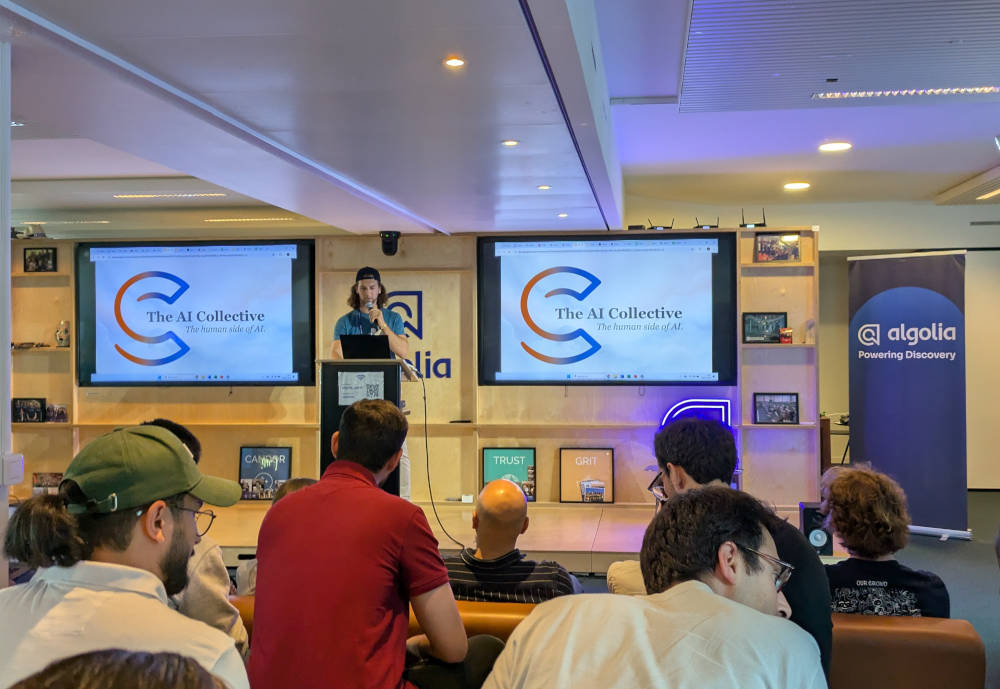
One of the events was Post-RAISE AI Party — powered by The AI Collective, which was fueled by great presentations:
- Running efficient MCP servers in production: Frédéric Barthelet
- vLLM & LLM-d: Efficient and Reliable Inference at Scale: David Szegedi
- Building Real-World AI with Web-Connected Agents: Boris Toledano
- Deploying AI Agents Inside a VTC Platform: Sylvain Cordier
and of course great people. Main discussion topics were how to build and sell AI projects, developing of AI agents for software security and some discussions related to projects hacked together during the conference.
Sadly I was not invited the second day at the Open Source Soirée. It seems that for this event they had limited capacity, and there were too many registrations.
Hackathon
The hackathon started on Friday (July 4) and I was not sure if I wanted to participate, so on Saturday I registered, tried to figure out how lablab.ai works. I wanted initially to join a team, but since I was planning to attend the conference the other days and also to visit the city, I decided to create a team and participate on my own on Saturday and Sunday.
The result is a project built on part of the speech condenser project, but with a concrete UI. The project is called VoiceVault and is based on the following stack:
- Minimal UI as SWA (Static WebApp)
- REST API for SWA and LLM interaction
- Worker for downloading and converting video/audio to mp3
- Worker for processing mp3 via ASR to text
The project was built on the Vultr track, so I integrated their service for running the app:
- Container registry for UI, API and Worker container images.
- Compute instance for UI, API, Worker containers and nginx reverse proxy.
- PostgreSQL database
- Object Storage (S3)
I completed the project on Sunday and left it as it is and made a quick video on how it works and a slide show and considered it good enough, as this is not my main focus of the event. I was, however, surprised how well the components integrated and that I was able to finalize it in this time.
What was particularly interesting was learning how to deploy the entire infrastructure on a weekend using a cloud provider I hadn't used before. Although this might not be surprising given that I'm quite used to AWS, Azure and GCP nowadays, it was still satisfying to see how quickly you can adapt to a new platform when the fundamentals are similar.
The project did not win (although I received some praise from one of the judges), but I received some sort of certificate for bringing it to completion:
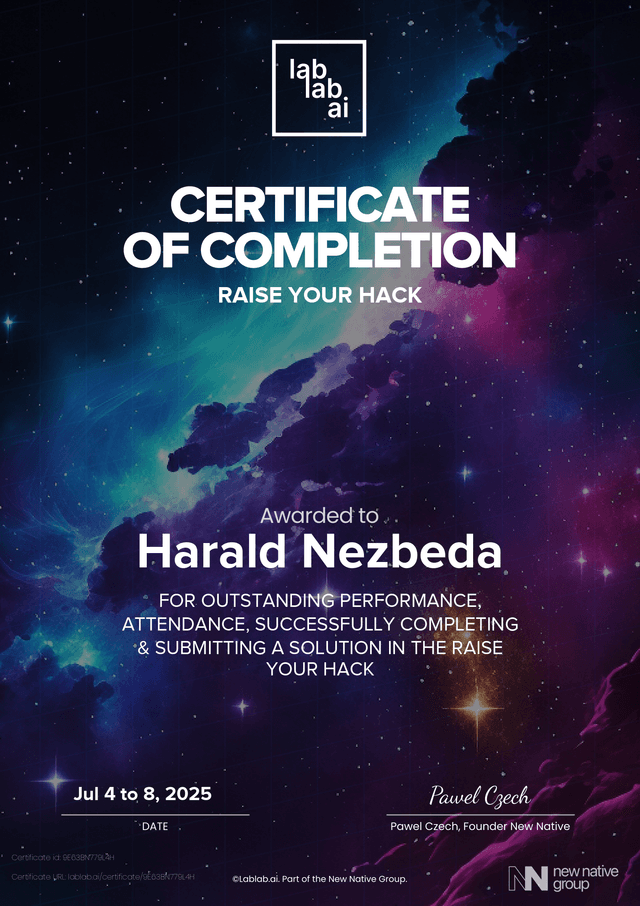
On Monday afternoon I received a notification for my registration at the hackathon, which allowed me to also join on site, but I required another badge, so I ended up having two and walking around with both, depending on which room I wanted to enter I needed the one or the other:
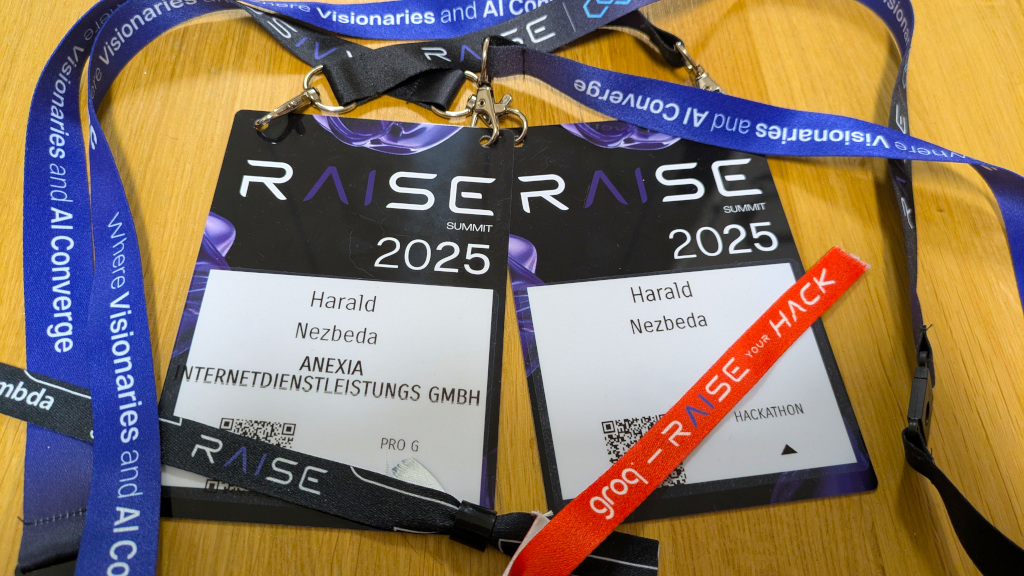
Conclusion
The RAISE Summit 2025 was an excellent experience that provided valuable insights into the current AI landscape and future trends. The conference successfully brought together industry leaders, entrepreneurs, and developers in a vibrant environment for learning and networking.
Key takeaways from the event:
- The AI industry is rapidly evolving with a strong focus on inference optimization and agentic workflows
- Open source solutions are gaining traction, though underrepresented at commercial events
- Networking opportunities at after-events are as valuable as the formal sessions
- Hackathons provide great hands-on experience even with limited time investment
I would definitely recommend attending future RAISE events for anyone interested in staying current with AI developments and connecting with the community. The combination of technical content, networking, and hands-on activities makes it a well-rounded conference experience.
Thanks again to Anexia for making this trip possible, and to Gabriel for being an excellent travel companion through the Parisian rain!